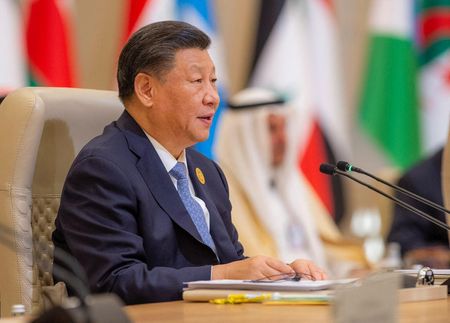BEIJING (Reuters) – Chinese President Xi Jinping telegraphed plans to revive consumption and reaffirmed an ambition to accelerate the country’s race towards technology independence, two of the biggest challenges facing the world’s second-largest economy.
China will establish a long-term mechanism to boost consumption so that consumers will have a stable income and be able to spend “without worries”, Xi was quoted as saying by state media on Wednesday.
China must resolutely implement a strategic plan to boost domestic demand, alongside efforts to push supply-side reforms, state media quoted Xi as saying in a study session of the Politburo, a top decision-making body of the ruling Communist Party.
“We will establish and improve a long-term mechanism to expand residents’ consumption, so that residents can consume with stable incomes, dare to spend without worrying about the future, and have a strong desire to spend in a good consumption environment,” Xi said.
Since the agenda-setting Central Economic Work Conference in December, top policymakers have repeatedly vowed to focus on bolstering consumption to drive an economic recovery this year.
China will strive to be a global leader in key scientific and technological innovation to achieve tech self-reliance and resolve the problem of foreign “strangleholds,” Xi said.
Xi and other Chinese leaders have vowed to strengthen China’s state-led system to achieve breakthroughs of core technologies, amid tensions with the United States.
Meanwhile, China will improve its investment mechanism, advance new infrastructure construction, expand investment in high-tech industries and strategic emerging industries, Xi said.
China will continue to spur private investment, he said.
The country’s economy grew 3% in 2022, far below the official target of around 5.5% and hitting one of its worst rates in nearly half a century. Growth is expected to rebound to around 5% in 2023, after Beijing ditched harsh COVID-19 restrictions in early December.
(Reporting by Beijing newsroom and Kevin Yao; Editing by Jacqueline Wong and Bernadette Baum)

